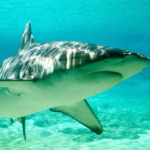Sharks are gorgeous animals, with strong jaws and numerous teeth.But, do baby sharks have teeth? Let’s figure out.
Baby sharks, like grown up sharks, have a full set of teeth. They become independent creatures as soon as they are born and swim away from their mothers. As a result, they are left to fend for themselves and their sharp teeth come in handy.
There are a lot of questions that people ask about shark teeth. Allow us to address some of them.
Image Credits: “Shark” by Leszek.Leszczynski is licensed under CC BY 2.0
Do baby sharks have teeth?
Sharks have impressively sharp teeth with serrated edges and powerful jaws. But, do baby sharks have teeth as well? Let’s figure out.
Baby sharks are born with a full set of teeth, unlike humans who start developing their teeth at around 6-12 months. Sharks have to live in the wild ocean, defend and fend for themselves. This is when their teeth come in handy since they don’t get any parental care.
Sharks are independent from a very young age and have numerous rows of teeth to cater to their needs.
What do baby shark teeth look like?
Sharks are enormous creatures with sharp teeth and strong jaws. Let’s figure out what shark teeth look like.
Most baby sharks have triangular or needle-like teeth. The pointed edge helps sharks cut their prey properly. It helps them serrate larger mammals into smaller pieces and makes the meat easy to consume. Baby sharks also have dense, flat teeth that can help them crush their prey.
Shark teeth are highly specialized and range in function. The type of teeth that sharks have largely depends on their diet.
Image Credits: “shark teeth” by Jo Naylor is licensed under CC BY 2.0
How many teeth do baby sharks have?
Did you know? Baby sharks are born with a full set of teeth. Let’s find out together how many teeth baby sharks have.
Baby sharks are usually born with 2 to 3 rows of teeth. As they grow older, the rows can range from 5 to 15. These are neatly layered and help the shark catch its prey and defend itself. The exact number of teeth a shark carries depends on various factors such as its breed, diet, and so on.
At one point, sharks can have as many as 3000 teeth. Bull sharks, for instance, have up to 50 rows of teeth.
Do baby sharks lose their teeth?
Sharks are born with teeth that help them defend themselves and catch their prey. But, do baby sharks lose their teeth? Let’s find out.
Baby sharks lose their teeth, and so do grown up sharks. In fact, sharks might lose approximately 100 teeth per day. This is because their teeth don’t have any roots and the teeth get stuck inside their prey while hunting. Sharks may lose thousands of teeth over their lifetime.
Young sharks can replace their teeth on a weekly basis. They aren’t attached to the gums and the teeth are replaced within a day of them losing it.
Do sharks eat their own teeth?
Baby sharks always lose their teeth since their teeth have no roots. But, do they eat their own teeth? Let’s find out.
Sharks swallow their own teeth once it gets detached. Sometimes, the teeth get stuck on the bodies of their prey as well. Since sharks continually lose their teeth throughout their lifetime, they grow new teeth quickly to replace them and fend actively for themselves while avoiding any danger.
The rate at which sharks lose and replace their teeth depends on several factors, the water temperature being the most important among them.
Do baby sand sharks have teeth?
Sand sharks are popularly found in tropical and temperate waters. Also known as sand tiger sharks, let’s find out if they have teeth.
Baby sand sharks are born with teeth, just like other shark varieties, and swim right away after being born. The teeth of baby sand sharks are long, sharp, and narrow, with smooth edges. Usually, the upper teeth are 44 to 48 in number, whereas the lower teeth can vary from 41 to 46.
Baby sand sharks also have teeth on the corners of their mouth, and these can be numerous. The teeth of sharks are sharp enough to help them catch and bite into their prey.
Are there sharks with no teeth?
Image Credits: “Basking Shark” by Green Fire Productions is licensed under CC BY 2.0
Sharks need teeth to defend themselves and acquire food. But are some sharks born without teeth? Let’s find out.
All sharks are born with teeth, but there have been exceptions to the norm. Most sharks have pointed, long teeth, but the Basking Shark and the Whale Shark are quite unique since they do not have the typical shark tooth. Instead, their teeth are more like whales, with filters to catch planktons.
Although not all sharks have sharp teeth, all shark breeds have teeth, and they form an essential part of the shark anatomy.
Do all sharks use their teeth?
Teeth form an essential part of a shark’s anatomy. But, do all sharks use their teeth? Let’s find out.
Whale Sharks, Basking Sharks, and Megamouth Sharks are some other breeds of sharks that do not use their teeth. Although they have many teeth, these animals are primarily filter feeders and do not need their teeth to bite and chew into food.
Which shark breed has the sharpest teeth?
Sharks need sharp teeth to bite into their prey and protect themselves. Let’s figure out which shark breed has the sharpest teeth.
Tiger shark and silky shark are two shark breeds with the sharpest teeth, and they are quite aggressive as well. Besides, there is also the great white shark which has very strong jaws and serrated teeth. It is worth mentioning here that although tiger sharks have sharp teeth, they get blunted faster.
Shark teeth break often and are not quite strong, but the lack of strength is made up by the sharpness. Most sharks have really sharp teeth.
What color are baby shark teeth?
An interesting aspect about baby shark teeth is their unique color. Let’s figure out what color shark teeth generally are.
Baby sharks are born with white teeth, but the color of the tooth found on shores and beaches can vary. This is because shark teeth undergo fossilization and the teeth you might find is likely to be black, gray, brown or beige. The color of shark teeth depends on the sediment underneath which they were buried.
Finding a shark tooth is rare since these often get either swallowed by the sharks or lost in the ocean. Shark teeth are also quite valuable monetarily.
Where does one find shark teeth?
Image credits: “30/4/2013 Shark Teeth” by barbourians is licensed under CC BY-SA 2.0
As we have mentioned earlier, shark teeth are valuable in terms of money. But, where can we find them? Let’s find out.
Shark teeth can be found on beaches, especially on various beaches of Florida and North Carolina. Fossilized shark teeth can often be found around river banks, beaches, or in sandpits. Usually, these teeth are very old since they have been moved and redeposited in several areas before they settle down.
Shark teeth in the form of fossils can particularly be found near phosphate pits and kaolin pits.
What is the best time to look for shark teeth?
You’d be surprised to know that shark teeth are not always available near river beds or sandpits. Let’s figure out what is the best time to look for them.
The best time to look for shark teeth is after a storm. This is because strong winds blow away the sand layers and expose the hidden layers that contain fossils. If you are a shark tooth seeker, look for them near the tide line and you are bound to find plenty of them.
Sharks have multiple rows of teeth that keep falling out and replenishing themselves, so shark teeth are available in plenty.
Conclusion
Sharks form an important part of the marine ecosystem and are magnificent animals.
Baby sharks are quite independent, relying on their own teeth to take care of their needs. Shark teeth are a valuable part of the shark’s anatomy and help them function properly. Sharks regrowing their own teeth is one of the most astounding wonders of nature and speaks volumes about the workings of these gorgeous creatures.




